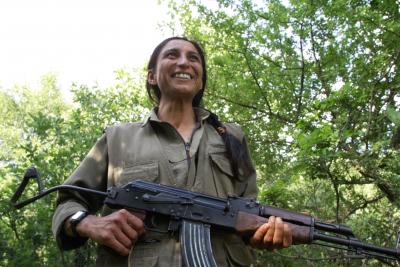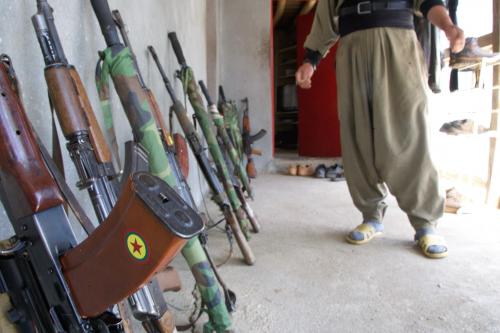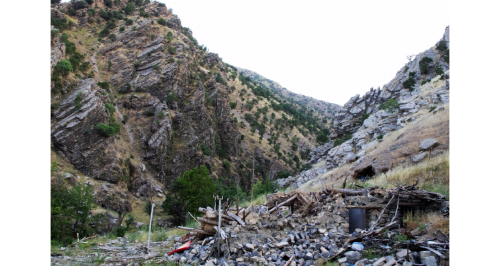Turkey targets PKK camp training to fight ISIS

QANDIL, Iraqi Kurdistan -- “They’ve killed my uncle, massacred my friends in the street like animals. Revenge -- this is why six months ago I joined the resistance,” says Agin, just 17 years old with an awkward doodle of mustache on his ruddy face. Other Kurdish guerrillas listen around the table, gathered under the shade of a farmhouse while the harsh sun hits the mountains of Qandil. After a brief silence commander Zagros thumps Agin’s back vigorously. “This recruit is a disaster. Just get him to Europe” he quips as his comrades chuckle.
The Turkish F-16s haven’t bombed here for three days. Qandil, PKK’s ideological and military training camp in the Kurdish Regional Government, northern Iraq, was established in the mid 1990’s. Thousands of guerrillas have been trained here according to the tenets of Abdullah “Apo” Ocalan’s post-Marxist “Democratic Federalism.” Political education, labour and warfare tactics fill the days of the Kurdish men and women here.
They sleep in caves during the snowy winters and under a tree in the warm seasons. Neither alcohol nor sex are allowed, noms de guerre have replaced those of civilian life, now a blurred memory where oppression emerges as uncontested protagonist. Sometimes, after having assessed that they are alive, their loved ones converge on these remote lands from Turkey, Syria, Iraq and Iran to see them, once every four, five or six years.
“We joined the resistance for them, for the Kurdish people and for all the downtrodden all over the world. We delivered our lives to the people, completely. The true guerrilla gives everything for the cause. The true guerrilla is a dead guerrilla”, explains Daylan, 30, while we walk through the 400 graves in the small Mehmet Karagsur cemetery.
The white headstones bear engraved the names and the dates of casualties from 20 years of wars. Some of them have just the word “shahid”, martyr, on it. Others, in a far corner, are just a mound of fresh earth topped by some withered flowers. The bodies have been with great effort transported from the scattered battles that the PKK is waging against the Islamic State. In south-eastern Turkey dozens of similar burial grounds have been destroyed by the government: “Thousands of people visit them every year. Erdogan is trying to kill the movement’s memory” comments Daylan.
Since 1978 the war between Turkey and the Kurdish Workers’ Party has caused more than 40,000 deaths. In 2013 Ankara and the movement undertook a peace dialogue that developed in a ceasefire and in the promise, for the more than 20 million Kurds living in Turkey, of a feeble form of autonomy.
“The peace process began to vacillate when the PKK helped the PYD to save Kobane, preventing the Daesh, back then supported by Ankara, to reach the border with Turkey,” says Reza Altun, founder of the PKK and executive member of the KCK, the Kurdish umbrella organization that hosts the parties of Iraq, Iran, Turkey and Syria united by Ocalan’s political program.
Altun never sleeps three days in a row in the same place. He arrived to the location of our interview, a hidden spot in the wood, climbing a stony path, accompanied by a guerrilla.
“The dialogue was eventually killed in July 2015, when the agreement allowed Demirtaş’ HDP to overcome the 10 percent barrier at the general election and prevent Erdogan’s AKP winning the majority in the parliament," he adds.
He immediately disavowed the existence of any Kurdish question and under the threat of ‘separatist terrorism’ was able in November to overturn the new elections’ result. A coup d’état” affirms the veteran.
“Unfortunately, as in the last 40 years, Europe is backing Erdogan’s fascist policies and swallowing the narrative of his media monopoly. Before it was because of NATO’s interests. Now it’s for the migrants, used to blackmail a coward continent” he adds.
To this day, although the US-led international coalition is found in the PYD’s army, PKK’s offspring in Syria, the most effective boots on the ground against the “Caliphate”, Washington and Brussel (but very few European countries if individually considered) formally acknowledge the movement as terrorist: “I shall repeat it, the PKK does not attack civilians. We have repeatedly condemned the actions of TAK, a newly born group which accuses us of passivity and has hosted several of our ex comrades” concludes Altun.
Erdogan’s concerns are clearly understandable. PKK’s resistance is scattered over several scenarios. In south-eastern Turkey the urban guerrillas attack the Turkish sieging military and police forces, which in turn react ruthlessly by levelling to the ground entire neighbourhoods. The organization claims that since the summer of 2015 more than 1000 civilians perished because of the government’s offensive. In February, has accused few weeks ago the UN representative for Human Rights Zeid Raad al-Hussein, one hundred have been burned alive in an underground construction in Cizre.
In 2014 it was the PKK which from Rojava, Syrian Kurdish north, sacrificed more than one hundred soldiers to create the corridor in Sinjar that was fundamental to save the Yazidis from the deadly, sweeping wave of Daesh that had disbanded the shoddy KDP peshmergas of Barzani, Turkey’s ally. In Rojava, which in March proclaimed its autonomy, the federal democratic system (another way to say libertarian socialism) imagined by Ocalan is fully implemented, backed by the entire population and solidly protected by the YPG, PYD’s powerful popular army. PKK’s warrior-monks are taking part to the campaigns to retake Raqqa and Mosul, fight along the PUK peshmerga in Kirkuk.
“This is why Turkey attacks us here. In one year they killed just three guerrillas, whatever their state news agencies say,” stresses Amina Mohammad, one of the two co-chairman of Qandil’s municipality, the political and social laboratory that since 2009 inspired the Rojava’s Kurdish population. Sixty one small villages with 1500 families or 8,000 people in all live here following the federal democratic model.
“They bomb the camps and the livestock, prevent tourists from coming, shattering the economy and trying to dismantle the strong link existing between the people and the resistance. It is the libertarian project that Erdogan is attempting to wipe out.”
“They don’t understand that oppression will always generate resistance” says Harji, a 29-year-old woman guerrilla with eight years in the army. Since her childhood she always dreamt to join the PKK.
“Yes, I have killed a man,” she says, “It all comes so natural when the battle begins. But I couldn’t look him in the eyes. You know, it’s part of women’s role to prevent the men comrades from desecrating the dead enemies’ bodies.”
Will she rest a bit, celebrate, use again a bit of make-up on her untimely wrinkled face, once the struggle is over?
“No way. The first day of freedom shall be the first day of a new challenge, spreading the revolutionary ideology to the population."
"Revolution is a long, internal process. Outside there is just slavery and self interest,” Herji says. The sky turns dark over Qandil and no Turkish warplanes, for today, seem willing to visit the mountains.
Luca Foschi is a researcher at Cagliari University working for his Ph.D
jp-lf




